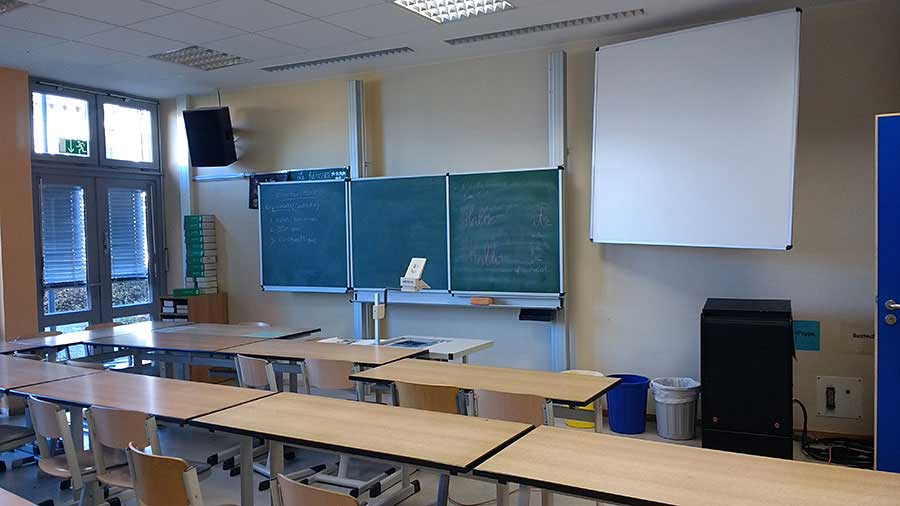|
Download ESL Books + Free PDFs
Save 25% on ESL Books for Teachers & Students Visit the ESL Expat Store and enter "SAVE25" at checkout! |
⋯ By Raquel ⋯
The United States shares many similarities with Germany because of a strong heritage connection. However, when it comes to the education system and what goes on in the classroom, it’s a slightly different story. Don’t let the fact that kindergarten is a German word fool you!
I taught English in Germany for a school year as a teaching assistant at a higher secondary school called Gymnasium. The German education systems varies slightly by state, but generally consists of separate levels of secondary education after 4th grade determined by students’ ability. Gymnasium is the route university-bound students take that spans from 5th to 13th grade (12th grade in some states).
I had the unique experience of being a foreigner teaching at a Gymnasium, where relatively few other foreigners have the opportunity to work. The reason is that teachers at primary and secondary schools in Germany go through a rigorous certification process, spending around seven years total studying and completing internships to enter the profession. This is likely why most non-German English teachers in Germany teach at private language schools or as tutors.
During my time abroad, I met other teaching assistants across the country who shared similar stories and quirky experiences. Here are a few unique things about teaching in Germany that I observed as an American in the classroom!

Students will use “Denglish” when possible
While speaking the local language isn’t always necessary when teaching English abroad, it certainly helps in understanding why students make certain mistakes. Because the English and German language have many crossovers, it’s easy for young German students to get words confused or just mash them together into denglish. In fact, many English words are trendy in Germany now because of media influence, so words like babysitten, cool, party, and downloaden are now as German as Bavarian beer and pretzels.
As such, it’s no surprise that when in doubt of a word, a student will quickly sub in the German equivalent, which may sometimes be pretty close to correct. The real challenge comes when (as a non-British person) you must distinguish students’ English between being incorrect and being a British variety…which brings me to my next point.
British English is widely taught in schools
Although many of my students spoke with a mix of American slang and a German accent, British English dominated classroom instruction. While it may be the case that American English is emphasized in some schools, other teaching assistants I checked in with across Germany shared the same experience as me.
Likely because of Germany and Britain’s geographic proximity, students largely learn British English growing up and many will end up taking the Cambridge exam to test for proficiency. It’s difficult for any native English speaker to re-learn the language as a different variety, but it definitely proved to be a useful lesson for me! Now I can tell you all about the distinct grammatical and vocabulary differences between American and British English.
You will teach a wide range of ages
…at least in a Gymnasium! With teachers prepped to teach students grade 5 and up, teachers at a Gymnasium can experience the full spectrum of ages in one day, running from a 5th grade class of clapping and singing to a 12th grade class of political debates. My lessons varied from reading a Christmas story to a room of wide-eyed 11-year-olds to discussing labor rights in Dubai with teenagers who were the age of first-year college students back home in the US.
Students will ask every stereotype about you
No matter your country of origin, people in other countries will have perceptions about your culture and countrymen, especially if they have had limited contact with the country. With a widely broadcasted political situation and massive media presence, America is no stranger to all the stereotypes.
Many of the questions I received from curious students revealed a ton about what kind of information they got on the news and from others around them in general. One of the most common questions was whether I owned a gun (I do not). I also had to explain that undocumented immigrants don’t sneak around at night in the United States while trying not to be caught, and that American English is still a legitimate version of the language. Many assumed that British English was the way and the truth.

Vacation days come in all shapes and sizes, and at the times you would least expect
Again, education in Germany is heavily state dependent, so holidays and the school schedule vary across each state border. With my region of Germany being predominately Catholic, we enjoyed a host of holidays observed by the entirety of the state, regardless of whether you identify with the religion or not. While summer vacation is typically a few weeks shorter in Germany than in the United States, there are several more holidays sprinkled throughout the year. Day like All Saints and Easter Monday were occasions to take off school, and for the local community to shut down.
Teaching English in Germany was just as much a learning experience for me, as much as it was for my students who had never talked to an American before. What are some interesting aspects of teaching abroad that you’ve experienced or are looking forward to experiencing for yourself?
About Raquel
Raquel is a US-native who has taught English in both South Korea and Germany. She is also a contributing author for Teach.com, a resource for Online Master’s in School Counseling degrees, teaching abroad and careers in education. In her free time, she enjoys writing about her experiences abroad and petting dogs.
Are you interested in teaching English in Germany?
Browse English teaching jobs in Europe on the job board.
Have you taught English abroad?
Submit your story and it could get featured in our next blog publication.
Read more stories about teaching English abroad on the blog.
